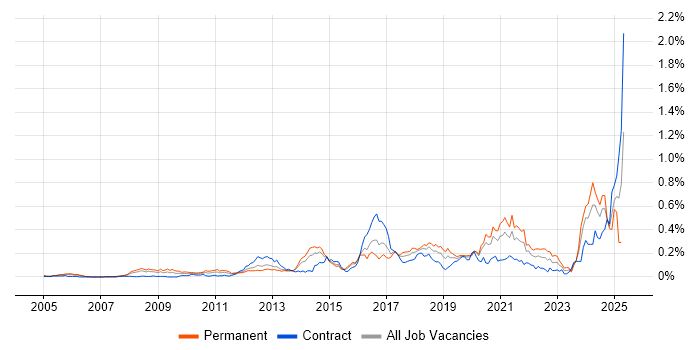Predictive Modelling
Central London > City of London
The table below provides summary statistics for permanent job vacancies advertised in the City of London requiring Predictive Modelling skills. It includes a benchmarking guide to the annual salaries offered in vacancies that cited Predictive Modelling over the 6 months leading up to 12 May 2025, comparing them to the same period in the previous two years.
| 6 months to 12 May 2025 |
Same period 2024 | Same period 2023 | |
|---|---|---|---|
| Rank | 130 | 148 | 224 |
| Rank change year-on-year | +18 | +76 | +53 |
| Permanent jobs citing Predictive Modelling | 13 | 31 | 3 |
| As % of all permanent jobs advertised in the City of London | 0.63% | 0.92% | 0.065% |
| As % of the Processes & Methodologies category | 0.66% | 1.00% | 0.068% |
| Number of salaries quoted | 10 | 9 | 3 |
| 10th Percentile | £55,925 | £61,000 | £44,850 |
| 25th Percentile | £72,500 | £63,750 | £58,500 |
| Median annual salary (50th Percentile) | £75,000 | £97,500 | £82,500 |
| Median % change year-on-year | -23.08% | +18.18% | -5.71% |
| 75th Percentile | £77,500 | £122,500 | £88,125 |
| 90th Percentile | £79,125 | - | £90,750 |
| Central London median annual salary | £75,000 | £97,500 | £82,500 |
| % change year-on-year | -23.08% | +18.18% | -5.71% |
All Process and Methodology Skills
City of London
Predictive Modelling falls under the Processes and Methodologies category. For comparison with the information above, the following table provides summary statistics for all permanent job vacancies requiring process or methodology skills in the City of London.
| Permanent vacancies with a requirement for process or methodology skills | 1,971 | 3,090 | 4,410 |
| As % of all permanent jobs advertised in the City of London | 96.01% | 92.07% | 95.23% |
| Number of salaries quoted | 1,488 | 2,446 | 3,687 |
| 10th Percentile | £42,350 | £41,250 | £43,515 |
| 25th Percentile | £53,750 | £55,000 | £56,250 |
| Median annual salary (50th Percentile) | £75,000 | £75,000 | £75,000 |
| Median % change year-on-year | - | - | +3.45% |
| 75th Percentile | £97,500 | £95,000 | £97,500 |
| 90th Percentile | £122,500 | £112,500 | £112,500 |
| Central London median annual salary | £75,000 | £72,500 | £75,000 |
| % change year-on-year | +3.45% | -3.33% | +3.45% |
Predictive Modelling
Job Vacancy Trend in the City of London
Job postings citing Predictive Modelling as a proportion of all IT jobs advertised in the City of London.

Predictive Modelling
Salary Trend in the City of London
3-month moving average salary quoted in jobs citing Predictive Modelling in the City of London.
Predictive Modelling
Salary Histogram in the City of London
Salary distribution for jobs citing Predictive Modelling in the City of London over the 6 months to 12 May 2025.
Predictive Modelling
Co-occurring Skills and Capabilities in the City of London by Category
The follow tables expand on the table above by listing co-occurrences grouped by category. The same employment type, locality and period is covered with up to 20 co-occurrences shown in each of the following categories:
